University of Suffolk NEWS
WELCOME
Respond, Recover, Thrive
At the end of June, we held our Annual Court meeting in person at The Hold. I talked about how the University of Suffolk had responded to the pandemic, how we are recovering and what our position looks like, whether thriving had been possible during the last 18 months and what it may look like going forward.
So, what is it that we can learn from the last 18 months and how will we continue our journey as we recover and thrive post pandemic?
I have seen excellence in our response to the pandemic from all colleagues and encouraging signs of our recovery as we commence this academic year. I also see that we have been able to thrive, growing new initiatives such as the DigiTech Centre, the Integrated Care Academy, the Institute of Technology partnership bid and a successful Ofsted progress monitoring visit alongside attracting our new professorial colleagues and other senior leaders, and new staff in all areas of our organisation.
But what attributes have we identified that we will all need to develop or lean into as we continue our journey for the longer term?
Resilience will not be enough — we need to strive for anti-fragility, the ability to prosper in the midst of chaos, rising above the fray to create a competitive advantage; we will need to be phygital — merging our digital and physical realities to best effect; we will need to be agile — working and planning in a flexible way as we develop new models for our future; and we will need to collaborate even more - building ecosystems that bring individual parts together to function as a single entity; and above all, we need to be curious — embracing change and willing to experience uncertainty in a constructive way with
passion for our University and its future.
Issue 12 - Autumn 2021
We will need time to see the fruits of our response, recovery and thriving and this academic year we need to embed and consolidate much of the work from the last two years. We also need to be able to see the longer-term benefits of the uncertainty that we have lived through for the last eighteen months. For those of you who are interested in natural phenomena, it’s worth noting the lessons we can learn from another natural disaster – that of the eruption of a volcano. The initial impact can be devastating, leading to hardship and distress. Yet volcanic ash is extremely rich in minerals and has antiseptic, antibacterial and antioxidant properties and as the volcanic material ultimately breaks down and weathers it forms some of the most fertile soils on earth, cultivation of which has produced exceptional crops and produce, such as the wines from Sicily on the slopes of Mount Etna.
This edition gives a good insight into how we are recovering and thriving at the University of Suffolk to the benefit of individuals and the communities that we work in and serve. Our future is exciting as we all individually and collectively look to recover and thrive. I commend this newsletter to you along with encouraging you all to look to our positive future. Together we will thrive.
Professor Helen Langton Vice - Chancellor and CEO
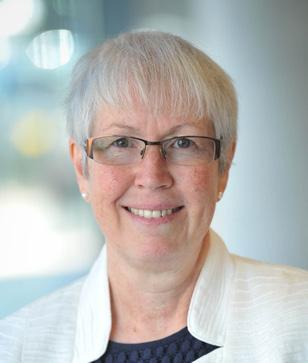
University of Suffolk NEWS Issue 12 Autumn 2021 Page 1
IN FOCUS
Introducing the ‘new look’ BECE Directorate
It’s an exciting time for Business Engagement activities at the University of Suffolk! The Directorate of Business Engagement, Careers and Employability, (formerly known as Business Engagement and Entrepreneurship) supports our Schools to connect industry with our academic expertise transforming our local community through knowledge exchange and enhancing the student and graduate experience through internships and entrepreneurship.
If you’ve been toying with an idea for a business engagement project, or just want to find out more about business engagement projects, come and meet us at our next ‘Meet the Team’ drop-in event on 18 November between 11.00am and 1.00pm in A0.06 (The Ideas room in The Atrium).
You are welcome to just pop by on the day, but it would be helpful if you could complete the quick form in advance so we have an idea of numbers to expect and how many cakes/biscuits we’ll need!
Professor Gurpreet Jagpal (PA Jayne Hammond) is the Pro-Vice Chancellor for Business and Entrepreneurship and heads up the Directorate which is split across four key teams: Those with an * have joined the University this summer.
Business Development and Knowledge Exchange (BDKE)
Emma Wakeling: Head of BDKE*
Kenny Lang: KTP Manager*
India Green: Business Development Manager, Crime and Social Justice/History and Heritage*
Mike Johnson: Business Development Manager, Leadership and Management*
Beth Sowersby: Business Development Manager, Creative and Digital/Sustainability and Energy*
Hannah Pearse: Business Development Manager, Health and Wellbeing*
Cathy Johnson: Business Development Administrator*
Ruth Paton: IWIC Manager
Debra Gingell: ICET Project Manager
Sarah Meyer: ICET Project Administrator
Careers, Employability and Enterprise (CEE)
Amy Carpenter: Head of Careers, Employability and Enterprise*
Heidi Love: Games Hub Manager
Sonia Brito: Senior Careers and Employability Advisor
Anna Flatt: Senior Careers and Employability Advisor
Annabella Richardson: Careers and Employability Advisor
Alumni Development (AD)
Kate Burgess: Alumni Relations and Development Manager
Apprenticeships Hub
Yvonne Malpass: Director of Apprenticeships*
Amy Ravenhall: Apprenticeships Skills Coach (Health)
Emma Robertson: Apprenticeships Skills Coach (Health)
Anna Rowe: Apprenticeships Skills Coach (Social Work)*
Jon Burton: Apprenticeships Compliance Officer*
Rachel Bullard: Apprenticeships Administrator
Issue 12 Autumn 2021 University of Suffolk NEWS Page 2
As you can see, there is now a Business Development Manager ‘attached’ to each School which means they’ll really get to understand what the expertise and research interests are and be able to match them with business needs in the wider community. Plus, working closely with the Careers, Apprenticeships and Alumni
Contents
teams will foster a climate of cross fertilisation of ideas and opportunities.
Please make sure you follow our social media channels – including our new LinkedIn page to keep up to date with what we’re up to and don’t forget to share our news with your own networks.
Welcome 1
In focus 2
News and updates
New £9.6 million Research and Engineering Facility opens
Launch of the Integrated Care Academy
HRH The Duke of Gloucester visits the University of Suffolk and officially opens The Hold Law students awarded following mooting competition
Student work experience finds the River Gipping toxic to fish Micro-Placement scheme 2021/22
Infozone becomes the Student Centre
Innovative partnership established between the University and Juniper Networks Annual Court 2021
ICET — In Career Education and Training Project Update
Primadonna Festival and Suffolk Folk
Introducing the ‘new look’ BECE Directorate 2 Apprenticeship Conference 2021 4 New Chair appointed 5 6 6 8 9 10 11 12 13 14 15 15 16 16
Good news for BA (Hons) Architecture course Knowledge Transfer Partnerships (KTPs) 17
East Building project update 18
Work begins on creating a new Health and Wellbeing Quarter 18
Sustainability 19
Net-Zero — Public Sector Plans and Pathways 19
Meet and greet 20
Introducing our new Director of People and Organisational Development 20
Student and graduate successes 22
The Hold ‘House and Home’ Exhibition 22
Celebrating ten years of Adult Learning in Suffolk 23
Over to you 23
University of Suffolk NEWS Issue 12 Autumn 2021 Page 3
IN FOCUS
IN FOCUS
Apprenticeship Conference 2021
The Higher and Degree apprenticeship provision at the University of Suffolk necessitates a multilateral approach between learners, employers, University professional services and academic staff, offering a positive and fruitful apprenticeship learner journey to all parties. As a relatively new process, it is important to continue to raise awareness of the nuances between standalone degrees and work-based learning, in addition to the regulatory bodies that apprenticeships must comply with.
For this reason, the Apprenticeship Hub was pleased to host its first ever ‘Apprenticeship Conference’ on the Waterfront Campus on Tuesday 27 July, focusing on the Education Inspection Framework (EIF), the difference between the Education and Skills Funding Agency (ESFA) and Ofsted.
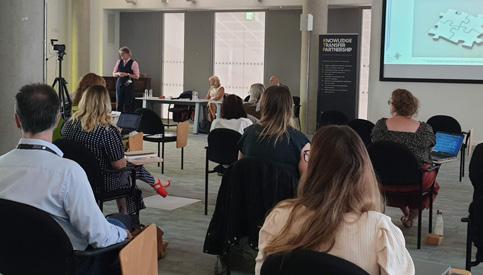
Attendees were welcomed by the Vice - Chancellor, Professor Helen Langton, who introduced the day by discussing the future of apprenticeships within the University in relation to the new government reforms. This was swiftly followed by presentations delivered by two external experts.
Dr Chris Jones gave a lively presentation showcasing his wealth of knowledge in education and with Ofsted (having previously worked as a teacher and external examiner across the sector as Her Majesty’s Inspector of Further Education and as an Ofsted Specialist Adviser for Apprenticeships). Chris was


engaging and informative alongside Kerry Boffey, CEO of the Adult Learning Improvement Network (ALIN), who demonstrated her 18 years of Ofsted Inspector experience and in-depth understanding of inspection with a discussion about the difference between the ESFA and Ofsted. Delegates were presented with the opportunity to partake in a Q&A session facilitated by Chris, Kerry and members of the Executive team to summarise the morning events.
Afternoon roundtable sessions were facilitated by internal leaders and managers and enabled delegates to discuss university procedures and policies for GDPR, safeguarding, PREVENT, functional skills, additional learning support and work scrutiny.
Feedback on the conference was very positive with the event considered a useful tool to support staff in developing their awareness of the scrutiny that apprenticeships experience, as well as a much-needed opportunity to network with new and familiar faces after a long awaited return to campus.
As a result of this encouraging response, the Apprenticeship Hub is pleased to announce that the ‘Apprenticeship Conference’ will be offered on an annual basis to continue to emphasise the role that we all play in showcasing the wealth of opportunities that the growing provision offers to the University and the local community.
Issue 12 Autumn 2021 University of Suffolk NEWS Page 4
Dr Chris Jones
Kerry Boffey
New Chair appointed
Mark Pendlington has been appointed to succeed Professor Will Pope as Chair of the University of Suffolk Board following Professor Pope’s retirement.
Appointed to the Board in January 2014, Mark Pendlington became Deputy Chair in October 2019.

He was part of the Board that led the institution in its quest for Independence in 2016.
Mark was previously Chair of the New Anglia Local Enterprise Partnership and Group Director of Anglian Water.
Mark succeeds Professor Will Pope, who has been Chair of the University of Suffolk Board since January 2015.
Mark said, “I am delighted to have the opportunity to lead the superb team at the University of Suffolk and thank Will for his outstanding service in recent years. The University is ambitious for our students and for our region, as we drive innovation in teaching and learning across a diverse and growing range of degree and other courses. We enjoy huge support from business and community leaders as well as from industry and local government. We see the University at the heart of driving economic growth, boosting skills and securing the place of this region as the best location in the UK in which to live, work and learn.”
University of Suffolk NEWS Issue 12 Autumn 2021 Page 5 IN FOCUS
New
£9.6 million
Research and Engineering Facility opens
The new DigiTech Centre located at BT’s Adastral Park in Martlesham officially opened on 8 October.
The Rt Hon Dr Thérèse Coffey, MP for Suffolk Coastal and Secretary of State at the Department for Work and Pensions, opened the £9.6 million research and engineering facility, which is a joint project between the University of Suffolk and technology and telecommunications firm, BT.
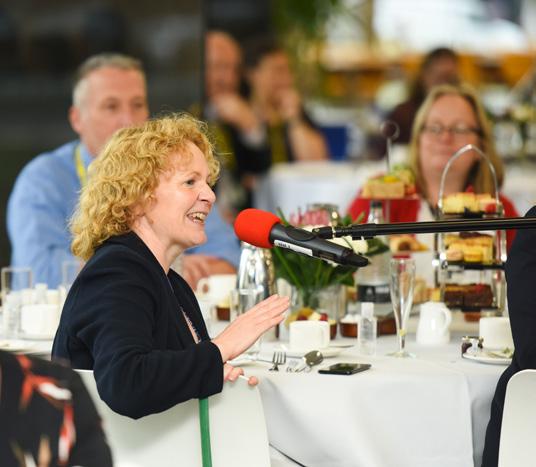
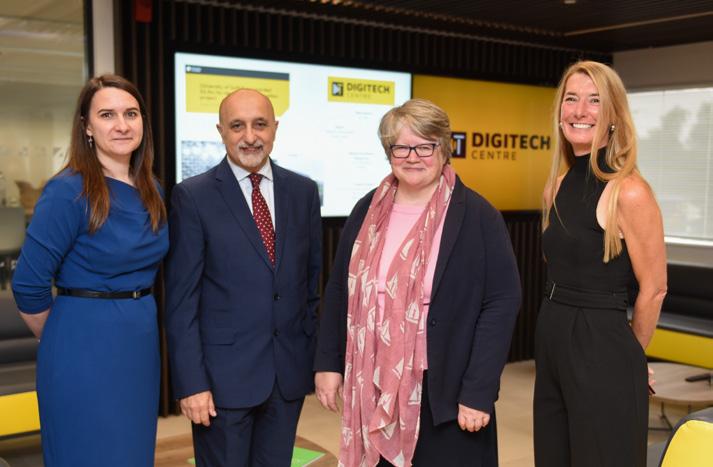
The DigiTech Centre provides cutting-edge digital skills for people looking to pursue careers in information and communications technology and received the blessing of Her Royal Highness, Princess Anne, when she visited Adastral Park at the beginning of the project.
Specialist high-tech laboratories form the heart of the new Centre and it will be used jointly by University staff, students and businesses at Adastral Park and across the region.
Professor Mohammad Dastbaz, Deputy Vice - Chancellor of the University of Suffolk, said, “In a rapidly developing technological age, we want the DigiTech Centre to be a state - ofthe-art ‘solution centre’ for SMEs and other businesses as well as a research and knowledge transfer hub. The Centre will have specialist laboratories in AI, Data Science, Network Security and Cyber range and will make Suffolk a recognised destination for industry-focused ICT and Digital Creative study programmes and an internationally recognised destination for continuous professional development in digital technologies.”
Issue 12 Autumn 2021 University of Suffolk NEWS Page 6
NEWS AND UPDATES
The DigiTech Centre has received funding from the New Anglia Local Enterprise Partnership (LEP).


C-J Green, Chair of New Anglia Local Enterprise Partnership, said, “This is a stunning facility and one which will help supply the skilled workforce demanded by our fast-growing and high-value digital tech sector. Ipswich is recognised as having a vibrant digital creative hub and students at the DigiTech Centre will have the opportunity to become part of the Adastral Park community. This investment will nurture skills, create jobs and increase growth and productivity in a sector that underpins the Norfolk and Suffolk economy.”
The DigiTech Centre has several facilities which span both the University’s Waterfront campus in Ipswich and BT’s Adastral Park. Lisa Perkins, Adastral Park and research realisation director at BT said, “This is a major milestone for us at Adastral Park as this new Centre will help supply a rich pipeline of new technology talent, which will not only be of huge benefit to BT, but also the entire region. There is also a growing demand for people with skills in new technologies such as Artificial Intelligence (AI) and data science. The courses and scholarships offered through the University of Suffolk will mean that we will have access to students graduating with these key skills right on our doorstep. The DigiTech Centre builds on a legacy of innovation and development at Adastral and ensures the East of England continues to be a major technology hub.” Find out more about the DigiTech Centre
University of Suffolk NEWS Issue 12 Autumn 2021 Page 7
UPDATES
NEWS AND
NEWS AND UPDATES
Launch of the Integrated Care Academy
At the end of May, the Integrated Care Academy (ICA) was launched, called ‘Foundation Week’!
It was a week-long launch that showcased the shared ambition of the ICA’s founding partners: University of Suffolk, Suffolk and North East Essex Integrated Care System, Suffolk County Council and Healthwatch Suffolk — to make real-world impacts on reducing inequalities.
With over 30 sessions and 1,100 registrations, the five-day event was jam-packed with presentations, enthusiasm and support from across the region:
“The ICA is here to stay.” Amanda Lyes, Ipswich and East Suffolk Chief Corporate Services Officer
“The ICA has huge potential, we have a fantastic future together.” Anne Radmore, Regional Director NHS East of England
“A catalyst for culture change.” Chantal Ski, Director of the ICA
Discussion topics were wide-ranging, touching people in personal ways and prompting us to think about our own needs, those of our families, and how we can support and improve integrated care across our communities.
Importantly, Foundation Week provided a platform for many of the lesser-known organisations each playing an integral role in supporting health and wellbeing across the region.
By the end of the week, we had identified four cross-cutting themes:
Importance of compassion in care
Necessity for cultural change
Access to meaningful data
Identifying and meeting unreported needs
Launched at a time when health and care systems are facing some of their greatest challenges in living memory, the ICA is an ambitious venture that aims to offer new, smarter ways of thinking to drive transformational joined-up care and reduce inequalities.

Issue 12 Autumn 2021 University of Suffolk NEWS Page 8
NEWS AND UPDATES
HRH The Duke of Gloucester visits the University of Suffolk and officially opens The Hold
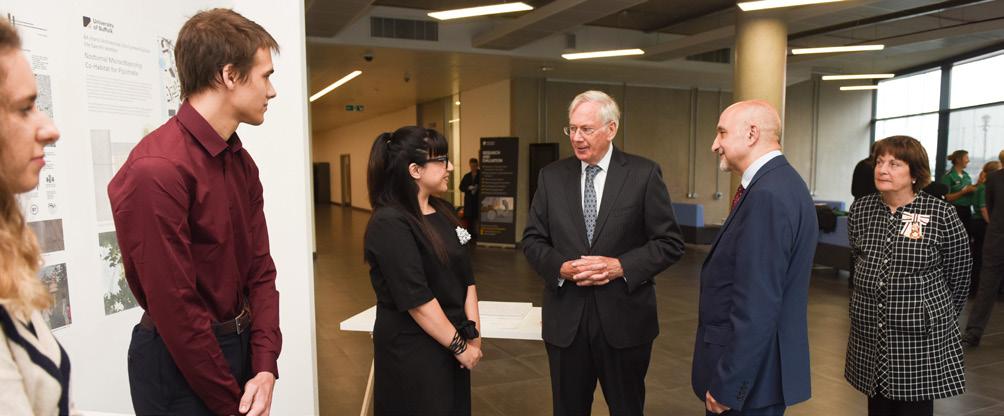
His Royal Highness The Duke of Gloucester visited the University in September as part of his tour of the county.
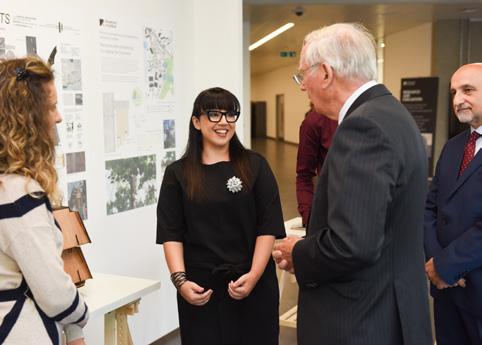
The Duke, a trained architect, viewed an exhibition curated by the University’s Architecture students. HRH was elected a corporate member of the Royal Institute of British Architects (RIBA) in 1972, and his fellowships include those of the Institution of Structural Engineers and the Royal Incorporation of Architects in Scotland.
His Royal Highness met Professor Mohammad Dastbaz, Deputy Vice-Chancellor of the University, and Dr Liana Psarologaki, Course Leader for BA (Hons) Architecture and the elected Chair of Education for the RIBA East Region. The Duke presented the award for Outstanding Architecture Student 2020/21 to Lois Whitnell. Lois also recently won the Chairs’ Award for Enhancing the Natural Urban Environment — Education and Cohabitation at the RISE Awards which recognises, celebrates and showcases exemplar case studies from the Built Environment.
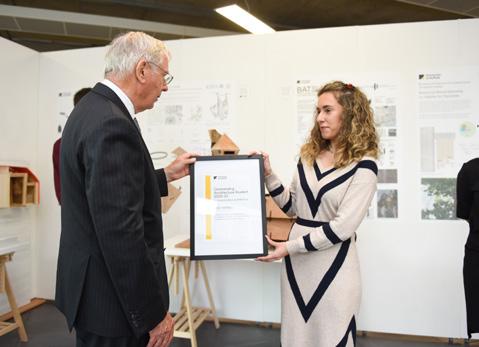
During his visit, His Royal Highness officially opened The Hold, the £20million archives and heritage centre on the Ipswich Waterfront, which is a partnership project with the University.
He met Tim Greenacre, Chief Operating Officer at the University, Dr Harvey Osborne, Course Leader for History and Acting Chairman of the Suffolk Records Society, and History students.
University of Suffolk NEWS Issue 12 Autumn 2021 Page 9
Law students awarded following mooting competition
Law students have taken part in a mooting competition to develop their legal skills and gain invaluable public speaking experience.
A moot is a mock appeal court hearing on a point of law and a mooting competition brings together two teams of two students who have a fictional legal problem. The teams spend some preparatory time drafting a skeleton argument and a list of relevant cases which are exchanged with the opposition before the moot occurs. The moot itself takes place in a mock courtroom and each team argues one side of the case before a judge. To conclude, the judge delivers their decision on the legal issues, and declares one team the winner.
The competition was open to all students on the Law course and was judged by his Honour David Goodin. From 2009 to 2017 he was the resident judge at Ipswich Crown Court and he served more than 40 years in the legal profession before his retirement in December.
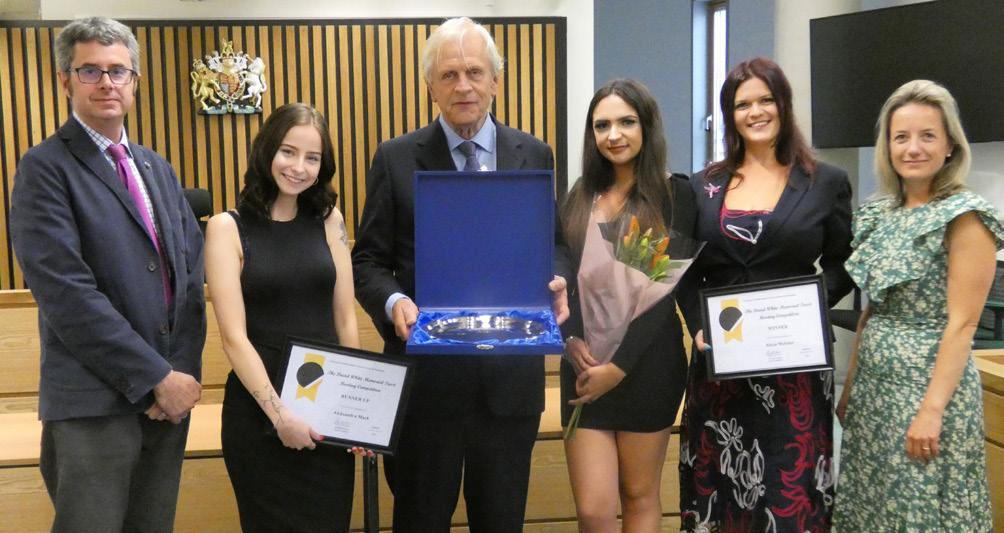
David Goodin said, “The standard was quite remarkable. As I said at the time it was well up to the standard of younger members of the junior Bar appearing before me routinely in relatively serious cases. It was clear the students had done their homework, they were well-researched and presented well-argued, coherent, persuasive speeches.”
Student Alicia Webster, who has just completed her degree, won the competition. Alicia was presented with a trophy sponsored by the David White Memorial Trust. David White was Head of Legal Services at Suffolk County Council and died in 2011. The Trust supports those wishing to go into the legal profession and has assisted the University in the development of the annual mooting competition.
First year student Aleksandra Mach and third year Jordan Chandler were named as the runner-ups.
Issue 12 Autumn 2021 University of Suffolk NEWS Page 10 NEWS AND UPDATES
Student work experience finds the River Gipping toxic to fish
Freddie Bury, a 6th Form student from Kent, had a week’s work experience in his father’s laboratory (Professor Nic Bury) assessing the toxicity of river water to fish. Professor Bury’s research at Suffolk aims to find alternatives to the use of animals in toxicity studies and other tests that are required by law for chemical environmental risk assessments. His PhD student, Penny Fenton, along with collaborators at King’s College London and NIVA, Norway are developing systems to replace fish in chemical uptake from the water. Freddie joined this group and used a gill cell line; these are cells derived from the gills of rainbow trout that are immortalised and constantly grow in the laboratory.
As Freddie’s work experience was just a week long, one water sample was taken from the River Gipping on the outskirts of Stowmarket. The gill cells were exposed to this water for 24 hours and then a number of tests were used to measure the metabolic activity of the cells, the integrity of the membrane that surrounds the cells and the membrane of lysomses inside the cells, (these act like garbage bins of cells and mop up waste
material). A positive control was run by adding a range of concentrations of the chemical, dichloroaniline (DCA), that is known to affect all three tests, to the river water. In addition, the gene expression was measured for a marker of oxidative stress. The toxicity of chemicals to these cells have been shown to correlate to toxicity in fish, and the test performed has recently been approved by the Organisation for Economic Co-operation and Development (OECD) to replace fish in toxicity tests.
It was not expected that the water would be toxic to animals, thus the expression of a gene associated with oxidative stress was also measured. Surprisingly, it was found the metabolism had reduced (blue circles in graph one and two) and lysosome membrane integrity effected (red triangle in graph 2), but not the cell membrane. It is not known what is causing this effect, but the gene expression results suggest the culprit is causing oxidative stress.

This assay is available at the University for testing of chemicals for regulatory purposes following OECD 249 guidelines and water monitoring following ISO 2115 guidelines.

University of Suffolk Page 11 NEWS AND UPDATES
Micro-Placement scheme 2021/22
Offering paid opportunities within the University, the scheme enables students to take on real responsibility by working on current projects and initiatives. A Micro-Placement is the perfect way for students to develop the skills and attributes they need to become successful graduates. Despite the challenges of working remotely, with the support of the wider University community, the Careers, Employability and Enterprise team were able to place 19 students during 2020/21. In total, 53 students have completed Micro - Placements since the launch in 2016, as the Supported Student Placement Scheme. We’ve seen a number of success stories as a result of the scheme - this year alone, three final year students who took part have secured work in graduate level roles, and two students completed a research project, which may result in their inclusion as authors on upcoming publications.
Micro-Placements are usually up to 30 hours but can be shorter, depending on project or department need. Placement hours can be completed in one block or set over a few months.
Areas of the University that have had a Micro - Placement student have found them to be

a beneficial addition to their team. For example:
“Both students have completed their hours with us today and have been absolutely brilliant. The whole team has really enjoyed working with them both and we hope they have enjoyed the experience too”.
Students feedback on what they gained from their placement has always been extremely positive. For example:
“Getting actual real-life experience - everything that I worked on ended up being modified or implemented as a project physically at the University ”.
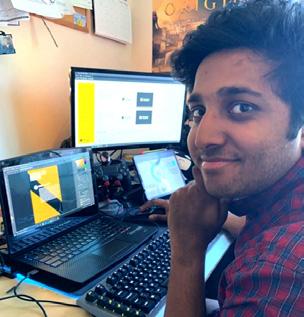
Many departments and projects within the University have hosted Micro-Placement students including, Careers, Library and Learning Services, Marketing, Science Laboratories, Sports Research and Sustainability projects to name just a few.
Find out more about Micro-Placements on our website.
If you would like to discuss hosting a Micro - Placement within your team during 2021/22, please email Annabelle Richardson.
Issue 12 Autumn 2021 University of Suffolk NEWS Page 12 NEWS
AND UPDATES
Two Micro-Placement students who now work in graduate roles:
Lauren Bruen
Alen Thomas
Infozone becomes the Student Centre
Interview with
Kaceigh
Burnett, Student Centre Manager
reflects the breadth of the support we offer especially around the role of our Student Life Advisors. It is exciting to be part of this process, sharing our experience to help shape how the service develops.
What are your expectations from the change?
What is the area/subject you get asked about most often?
Can you sum up the work of your team?
We are Google for the University, we deal with everything within the student journey, we also provide support to staff as we tend to be their first port of call. Within the Student Centre, we have Student Life Advisers working on the Active Bystander initiative, Student Life Mentors and all the other support we offer. We also cover Reception and front-of-house for visitors.
What does an average day look like?
There is no average day, other than our opening hours, but even that is a bit flexible because the University is so busy with events and student activity.
You have just been rebranded the Student Centre, what prompted that?
As a relatively young university we are committed to change and this development is a part of that. Formerly Infozone, the Student Centre, more clearly
We now have more involvement with the Access Agreement Plan (APP) objectives. We deliver all the usual support and ensure everything we do is fully inclusive for everyone in our university community. The Student Life Advisers sit on focus groups across the organisation to review student and university processes to ensure they reflect the needs of all students and staff. The team now have more opportunities to feed into how processes evolve and develop, adapting as new issues arise.
How have the students queries changed over the last 5/10 years?
The increase in student numbers has had an impact and technology has changed the way we deliver our services. With experience we are now more proactive, we anticipate issues and make changes to improve how we engage with everyone. Our role within the University has evolved to become a central tool of engagement, we often get academics with a particular reason to reach out to students using us to support that engagement.
It depends on the time of year, we get student life in its entirety, it embraces absolutely everything. The things we get asked about are as diverse as the student community itself. It is what makes this job so brilliant for the team, no two days are the same, it keeps us on our toes.
What is the best bit about your work?
The students. Going to university can be challenging, we understand the importance of the student journey in someone’s life and it is our job to support that. From the moment they arrive, uncertain and often feeling vulnerable with individual challenges, then to watch them walk across the stage at graduation, to have shared in their personal development and self-belief, it’s a privilege.
What surprises you most about the work?
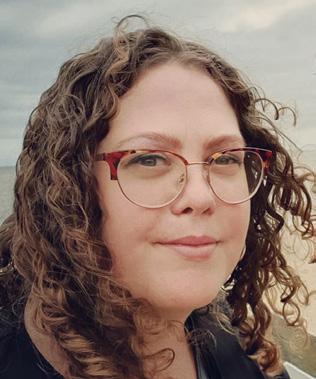
Nothing, I have seen and heard everything. What does surprise me is our ability as an organisation to grow and yet retain the genuine sense of community that we know and hear acknowledged by all our students and staff, we talk to people, they share their stories, we are our community.
What do you find yourself saying most often to students?
‘There is no such thing as a stupid question, surprise me!’
‘It’s like eating an elephant, we just need to break it down into little bites.’
University of Suffolk NEWS Issue 12 Autumn 2021 Page 13 NEWS
UPDATES
AND
Innovative partnership established between the University and Juniper Networks
The University has embarked on a new academic partnership with Juniper Networks, a leader in secure, AI-driven networks, which will see the new DigiTech Centre at BT’s Adastral Park in Ipswich, Suffolk furnished with state-of-the-art networking equipment.
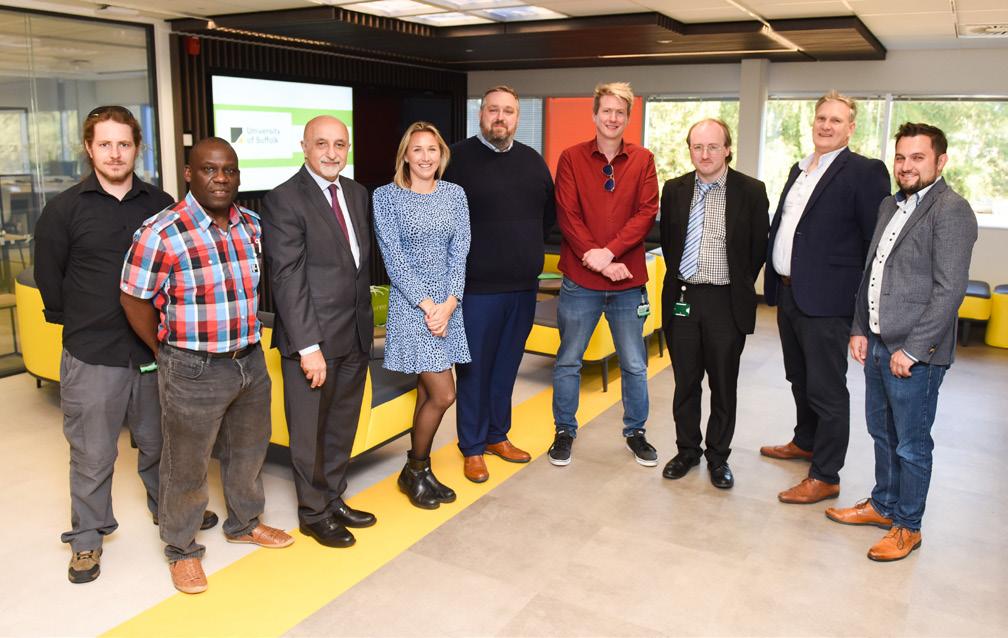
The partnership is the first of its kind for the University of Suffolk and a network technology vendor. The University trains the next generation of BT network engineers through its degree apprenticeship programme. Apprentices and undergraduate students will now have the opportunity to benefit from a hands-on learning experience within their own closed environment in the brand-new DigiTech Centre. Students
will be free to experiment and explore different technical solutions, as previously they were only able to build their skills virtually.
Working with Juniper and the Juniper Academic Alliance Program will also provide an accredited pathway for certified training in networking, cloud and automation technologies to enable students to become the next generation of technicians once they graduate. This will include access to Juniper’s wealth of educational resources. The first students have already enrolled on Juniper certification tracks.
The DigiTech Centre officially opened on 8 October. A feature about this can be found on pages 6–7.
Issue 12 Autumn 2021 University of Suffolk NEWS Page 14
NEWS AND UPDATES
Annual Court 2021
The University of Suffolk’s Annual Court meeting was held on Tuesday 29 June 2021. It was great for it to take place in the “The Hold” for the first time, welcoming guests online and, after 16 months, in-person as well. The University’s Court embodies our commitment to consultation and openness and exists to play an important role in seeing that we are responsive to our community and stakeholders in fostering closer relationships with the wider world.

ICET — In Career Education and Training Project Update
Following a competitive tender process, we are thrilled to announce that we will be working with the following companies to deliver training from November 2021:
Company Training
Peoplewise Strategy for Directors
Institute of Directors Leadership for Directors
Institute of Directors Leadership for Emerging Women Leaders
Quanta Training Ltd Agile Project Management
TrueCue/Institute of Directors Data Analytics General Assembly Product Management General Assembly Digital Marketing General Assembly
Up to 50% funding towards the cost of these courses plus additional business support is now available to SMEs in Norfolk and Suffolk.
The Institute of Directors released their own press release about the project this week.
In July, ICET also released a 20-minute webinar outlining a wealth of support for local SMEs including how to fund apprentices, apply for funding to upskill employees, and access the 3D Printing Suite at the University.
Front End Web Development
SMEs can access the webinar here
If you know of any SMEs (not more than 250 employees) including non-profit organisations in Suffolk or Norfolk who might benefit, please share this information with them.
Thank you for your support.
Debra Gingell Project Manager
ICET – In Career Education and Training Project
University of Suffolk NEWS Issue 12 Autumn 2021 Page 15 NEWS AND UPDATES
NEWS AND UPDATES
Primadonna Festival and Suffolk Folk
The University was delighted to sponsor the Primadonna Festival in August which took place at the Museum of East Anglian Life in Stowmarket and is the first literary festival in the UK to specifically give prominence to work by women, particularly those whose voices are seldom heard.
Students and academics from the University’s BA (Hons) English degree programme and the MA Creative and Critical Writing formed part of the Festival’s Creative Writing ‘Masters’ programme giving participants the chance to work alongside bestselling authors, playwrights and poets.
Course Leader for the MA Creative and Critical Writing at the University and international bestselling novelist, Dr Amanda Hodgkinson, said, “Being part of the Primadonna Literary Festival was important for many reasons, not least because our students are the creative force of the future. Literary festivals do great things for books, writers and readers. Most importantly, they grow creative-minded communities and that’s what the University of Suffolk feels passionately about. The Primadonna Festival is a fantastic opportunity to celebrate and support our growing community of talented students
and we hope to collaborate with the team again in the future.”
Students on the MA Creative and Critical Writing took the opportunity of the Festival to showcase their new publication: Suffolk Folk: An Anthology of East Anglian Tales for the 21st Century.
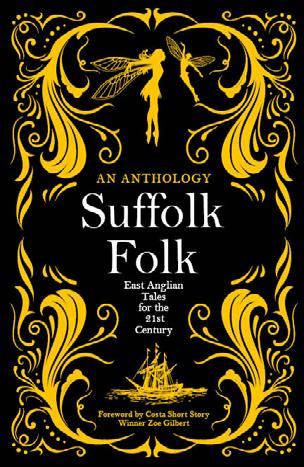
The collection of stories celebrates folk tales and legends from our region with each one set in a different town or village. From green children and fairies, to mermaids, malekins and monsters, these original retellings of folk tales for today contain the limitless power of storytelling and provide the perfect escapism from a busy, turbulent world.
Suffolk Folk is now available in bookstores nationwide including in Hive which uses independent book stores to source its books.
Good news for BA (Hons) Architecture course
Following a successful visit by the Royal Institute of British Architects (RIBA), the BA (Hons) Architecture degree at the University of Suffolk has achieved RIBA Candidate Course status. The recognition means students and staff will have access to scholarship, mentorship and training opportunities with the RIBA. Next year, the RIBA team will visit again and following it, the University hopes to achieve double accreditation status. The news comes after the degree achieved Part 1 prescription by the Architects Registration Board (ARB) last month.
Professor Alistair Mathie, Dean of the School of Engineering, Arts, Science and Technology, said, “We are delighted to see the Architecture course receiving the recognition it deserves, both with the successful visit by the RIBA and the prescription by ARB. Achieving these accolades in less than three years is impressive work and I congratulate the team. For our current students and anyone considering to study Architecture at Suffolk, it demonstrates the ambition of the academic team and the respect that our course has within the industry.”
More information about studying Architecture
Issue 12 Autumn 2021 University of Suffolk NEWS Page 16
Knowledge Transfer Partnerships (KTPs)
Although KTPs were established in 1975, you may not be familiar with the scheme. Our new University of Suffolk KTP Manager, Kenny Lang explains more.
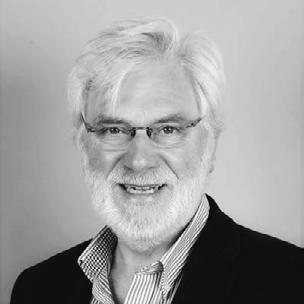
innovative and challenging, and last between 12 and 36 months.
They work by providing a three-way partnership between the Associate (a graduate), the Business and the Knowledge Base (an academic partner).

Benefits to Academics
Benefits to Graduates
KTPs have been incredibly successful in developing collaboration between businesses and academia.
Over the last 15 years, £2.5bn in grants have been awarded and over 11,000 projects funded.
Businesses can be any size and from any sector, but the project must be high impact,
KTPs provide the opportunity for academics to apply knowledge and expertise to real-world challenges and are a valuable source of research income. They are a means of identifying new research themes which contribute to the Research Excellence Framework (REF) with outcomes often published in high impact journals and conference papers. Plus working with innovative companies for ongoing collaborations can be extremely rewarding.
KTPs are one of the biggest career platforms for talented graduates and post-graduates in the UK – to date there have been over 12,000 KTPs in almost every industry sector and in companies of all sizes: from micro businesses right up to global organisations such as Unilever and Rolls Royce. Right now, over 100 Knowledge Bases, including the University of Suffolk, and over 800 graduates are involved in KTPs.
If you are keen to be involved in KTPs, please email Kenny Lang to discuss your particular areas of interest.
University of Suffolk NEWS Issue 12 Autumn 2021 Page 17 NEWS
UPDATES
AND
EAST BUILDING PROJECT UPDATE
Work begins on creating a new Health and Wellbeing Quarter
The University’s new Health and Wellbeing Quarter will be opening in spring 2022. It will offer a space on campus dedicated to the promotion of integrated care among our student body, practice partners and the wider community.




The new building will house two floors of brandnew clinical simulation facilities, featuring two state-of-the-art hospital wards, a midwifery birthing unit, a new sports and exercise facility, a working radiography imaging suite, counselling/ physiotherapy clinic rooms and the Suffolk Institute of Health and Wellbeing research.

Issue 12 Autumn 2021 University of Suffolk NEWS Page 18
Net-Zero — Public Sector Plans and Pathways
On 1 September the University of Suffolk was delighted to host on behalf of Suffolk County Council the second leg of the PlanetMark eight-month Zero Carbon tour. Backed by the Department of Business Energy and Industrial Strategy, this tour seeks to share conversations and case studies focused on reducing GHG emissions and achieving net zero across the UK, before arriving in Glasgow for the UN Climate Change Conference in mid-November.
In 2019 the UK became the first major economy to legislate for net-zero, changing the long-term target in the Climate Change Act 2008 to net-zero by 2050. To meet this legal requirement public sector organisations across the UK have now set their own carbon targets with many aiming to achieve net-zero ahead of 2050 with the aim to build greener, cleaner, safer, fairer, healthier, and more resilient public services whilst securing a green recovery from COVID-19. Following an extensive review and modelling consultation undertaken by a net-zero expert panel, the NHS has set itself ambitious targets, supported
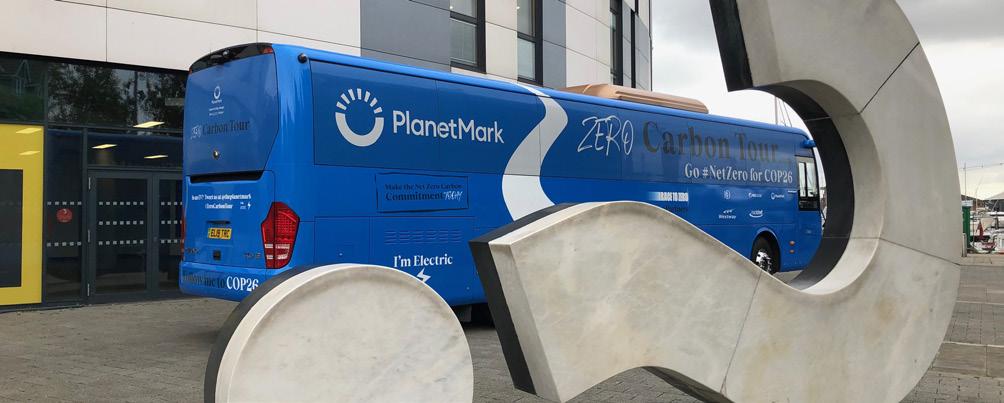
by immediate action to address the projected health impacts associated with climate change and progress a pathway to netzero by 2040. The consultation acknowledged that reaching net-zero involves going beyond simply decarbonising buildings, travel, and the products they rely upon, and seeks to reimagine aspects of how care is delivered, including the provision of greater access to telemedicine and digitalisation. The University is in the process of further developing its relationship with the Sustainability Lead for our regional Clinical Commissioning Groups (CCG’s) so that we may work together to support and identify solutions for what is a complex and challenging organisational transformation.
Additionally, over 300 Councils across the UK have declared a climate emergency and are key agents, working with partners and local communities in tackling the impact of climate change within their regions.
The scale and progression of this activity is explored by University of Suffolk PhD researcher Peter Gudde, in
Gudde, P., Oakes, J., Cochrane, P., Caldwell, N., Bury, N. 2021. ‘The role of UK local government in delivering on net-zero carbon commitments: You’ve declared a climate emergency, so what’s the plan? ’ This paper is available in the Energy Policy Journal published by Elsevier, an international peer-reviewed journal with an impact factor of 6.29.
Building on his 2019 paper published in the Sustainable Ecological Engineering Design Selected Proceedings published by Springer from the International Conference of Sustainable Ecological Engineering Design for Society (SEEDS) 2019, Peter’s latest paper, Gudde, P., Oakes, J., Cochrane, P., Caldwell, N., Bury, N. 2021, The role of local authorities in renewable energy investment: Getting the money to flow, addresses two key questions with respect to Renewable Energy (RE) deployment; exploring the barriers to RE projects in the decision-making process and the changes needed to help local authorities and others improve their RE investment decision-making.
SUSTAINABILITY
MEET AND GREET
Introducing our new Director of People and Organisational Development
Julie Burton joined the University on 21 June 2021 as its new Director of People and Organisational Development (POD). Julie leads the POD team and as a member of the Senior Leadership Team will spearhead the development of our People Strategy in the coming months.
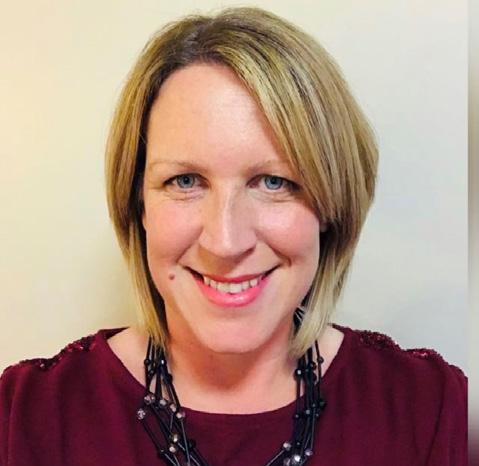
and success in this area will be very rewarding.
I was also attracted by the emphasis on the University’s values — which resonate with me personally and will be core to the work of the POD team over the coming years.
Coming into the role from outside the HE sector has its challenges but also its benefits. Are there any similarities compared to your career experience to date?
The majority of my career has been in the NHS (with spells in local government and logistics). Running through all of it is has been the need to deliver high quality, value for money, responsive services supporting the development of the workforce. I am used to working within complex environments, with tight governance and accountability for my own and my team’s outcomes. I am also used to change; nothing ever stands still for long!
Welcome to the University Julie. What was it about the Director role that first attracted you?
The first thing that attracted me to this role was the ‘Organisational Development’ (‘OD’) element; this is an area that I’m really passionate about and I’m keen to develop an approach which will benefit staff, students and the wider success of the University. It is really important that we tailor our OD approach to ensure our initiatives, interventions and processes add value
How do you plan to get to know us as an institution and identify how we can best support and develop our people going forward?
The best way to get to know a new organisation is just to get stuck in! So I am meeting and speaking with as many people as possible to understand the journey the institution has been on so far; the positives and frustrations about working within the University and the key things that would make a difference to people as we move forward. I am constructively questioning as I go along!
Issue 12 Autumn 2021 University of Suffolk NEWS Page 20
MEET AND GREET
Casting your mind forward, what will be the indicators that will show we are starting to achieve a positive impact on developing our workforce in future?
I really hope we can evidence positive workforce development through a number of indicators. Staff opinion that we are a ‘good employer’ is crucial and also that our policies, practices and approach are genuinely supportive, encourage the embodiment of the University’s values and enable our people to do their best. Being able to attract and retain high calibre individuals to work with us and help achieve the University’s longterm vision is also paramount.
Flexible ways of working have become the norm for most of us over the past year. What are your thoughts on how we can take advantage of the opportunities to work differently in future?
The future model of working undoubtedly has flexibility at its heart. The advances that have been made in mindset alone have been phenomenal compared to even a few years ago when often flexibility was experienced by people very differently.
Considering our approach in the future, we need to be mindful of the challenges whilst ensuring we realise the benefits. For me, there needs to be a sustained shift in mindset and approach towards output and outcome-based working and management. Trust sits at the heart of this
and there is a need to empower our staff to work in the ways that best suit the roles they are employed to undertake but allowing enough flexibility for people to remain healthy, focused and balance their lives – whatever their circumstances.
We need an authentic understanding around making more agile ways of working a genuine success. Central to this will be honest dialogue. There is also a need for reconnection with the wider institution to ensure our new normal is not siloed or fragmented, and it is hugely important to embrace and develop the digital and estates aspects which will help to make the University a thriving and effective institution.
University of Suffolk NEWS Issue 12 Autumn 2021 Page 21
STUDENT AND GRADUATE SUCCESSES
The Hold ‘House and Home’ Exhibition
The Hold invited second-year BA (Hons) Graphic Design (Graphic Illustration) students studying on the professional practice module to collaborate with Suffolk Archives to design a visual identity for an upcoming House and Home Exhibition.
The House and Home Exhibition is about a sense of place, what makes a home, and how this has changed through time. The collection looks at 14 different ‘homes’ across Suffolk, from lost country houses to high rise flats, from orphanages to council estates.
The historical archives are complemented by a series of creative texts written by University of Suffolk Creative Writing students inspired by the archives to explore the topic of home. This work was led by Dr Amanda Hodgkinson, whose novel 22 Britannia Road will also feature in the exhibition alongside a wide range of historical sources.
The creative brief was to produce graphics for a full suite of marketing materials to promote the exhibition, designed to boost public awareness and increase visitor numbers to the exhibition and The Hold in general. The students set up small studios, worked together to create professional designs, and then pitched online to the client, all during the pandemic. Lecturer in Graphic Design, Jane Hackett, said, “Engaging with industry is an integral part of our degree
course, and I am grateful to The Hold for the opportunity to collaborate on such an exciting project. I was incredibly proud of the students’ solutions, considering the difficulties they had to endure with communicating and working at a distance.”
After the final presentation, Emily Shepperson, Exhibition and Interpretation Officer at The Hold, said, “A real thank you for working with us on this, it has been a fantastic opportunity and wonderful to see all of the students’ work. Clearly, a huge amount of hard work and creativity has gone into each piece. We have loved the process and feel really privileged to have been able to work with you all.” The winning team have developed and produced the final designs, and all will be revealed when the exhibition launches this October.
We are particularly pleased the partnership with The Hold is set to continue and a new project is already scheduled for later next year. Finally, student feedback has been positive; working in a studio environment and taking on roles and responsibilities expected in the industry, meant they were fully engaged in the process and found the whole experience incredibly rewarding.
More information about The Hold, House and Home Exhibition
Issue 12 Autumn 2021 University of Suffolk NEWS Page 22
STUDENT AND GRADUATE SUCCESSES
Celebrating ten years of Adult Learning in Suffolk
The Suffolk Adult Learners’ Awards 2021
For ten years the University of Suffolk and Suffolk County Council have been recognising the achievements of adult learners in the county with the Suffolk Adult Learners’ Awards. The Awards celebrate the commitment shown by tutors, volunteers, providers and learners’ while demonstrating the impact adult learning has on the lives of individuals.
In this year’s live online ceremony, hosted by Karen Hinton, Head of Student Recruitment and Outreach, two members of the University were celebrated.
Darryn Thompson was a runner up for ‘Tutor of the Year’ having been nominated by two of his students, Claire and Hayley, who were incredibly grateful for his support, flexibility and belief in them.
Angela Cobbold was a runner up for the ‘Pastoral Support Award’ — one of two new Awards categories to recognise the way learning changed during the pandemic. Angela was nominated by three of her learners for her supportive and understanding nature and for always going above and beyond for her students.
Miles Cole, University of Suffolk External Relations Project Manager, said, “After the disappointment at having to cancel the 2020 Awards due to the pandemic, we were determined to celebrate adult learning in Suffolk this year. The online ceremony was a wonderful event, once again we heard incredibly moving and inspiring stories of the power of adult learning to transform people’s lives, empower individuals and communities and the dedication of staff and organisations that provide it. Congratulations to all the winners and runners up and all those who were nominated in what has been a very difficult year.”
Harvey Gurnham Kaur Singh was awarded ‘Inspirational Learner of the Year’ as well as the overall ‘Outstanding Learning of the Year’ and Christine McGuinness was recognised as providing ‘Outstanding Services to Adult Education and Training in Suffolk.’
The full list of winners and runners up for each category can be found on our website
OVER TO YOU
We want this newsletter to be a reflection of all of the excellent projects, research and work being undertaken by our staff. If you have any feedback and suggestions for content please get in touch by emailing Atlanta Blair at atlanta.blair@uos.ac.uk
Thank you.
University of Suffolk NEWS Issue 12 Autumn 2021 Page 23































